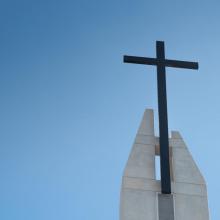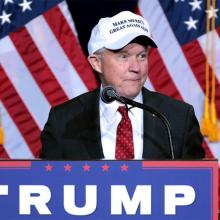united methodist church
While I was attending seminary, I came across a book outside of our assigned texts that would help transform my thinking on LGBTQ+ inclusion in the church. The name of the book was Our Lives Matter: A Womanist Queer Theology, and the author of the book was womanist theologian Pamela R. Lightsey.
Up to that point in my life, I had been taught that being a Christian while also proudly identifying as a member of the LGBTQ+ community was impossible. But Lightsey’s Our Lives Matter challenged those preconceived notions as she argued for full LGBTQ+ celebration within the universal church. I began to realize that my discrimination was not only hurting LGBTQ+ people, it was also hindering my ability to imagine a world in which all people could be free. The lesson I took away from that book was this: If we don’t have the capacity to imagine a world in which LGBTQ+ people are free to be fully themselves, then our imagination of liberation is truncated.
CIVIL RIGHTS LEADER Ella Baker utilized the strength of her voice at the height of that movement to fundamentally question the notions and ideas of equality and leadership in this nation. In 1969, Baker said, “[T]he system under which we now exist has to be radically changed.” This means “facing a system that does not lend itself to your needs and devising means by which you change that system.”
Black women have long been considered the backbone for civil rights, social justice, church advancement, and animators of democracy in the United States. If this is so, then why are so many still overlooked for advancement in political power as well as the everyday jobs that they are more than qualified for?
While “women” won the right to vote in 1920, Black women fought for about another half century to exercise their right. The inequities of gender, race, and access are still with us — and there is no greater time than now to push hard for political and social advancement.
CHRISTIAN DENOMINATIONS IN North America and around the world have been torn asunder around questions concerning the full inclusion of LGBTQ members. The United Methodist Church is no exception. When (or, because of COVID-19, if) the church gathers in August for its General Conference, the hottest topic on the table, in the words of UM News, is “the denomination’s intensifying debate around the status of LGBTQ Christians—which has already led multiple congregations to disaffiliate.”
But for many pastors of local congregations—and, needless to say, for many individual Christians who love one another—questions of same-sex marriage aren’t, at heart, about church policy, doctrines, or books of discipline, as important as those ecclesial structures may be. They’re about covenant, and commitment, and pledging fidelity in the context of a faith community that loves them and holds them accountable—in other words, they’re about marriage. As Methodist pastor Bill Wylie-Kellermann and his daughter, Lydia Wylie-Kellermann, explain in our cover story, sometimes following the love ethic of Jesus requires trusting “the grace of God in Jesus Christ” and asking “the grace of [our] sisters and brothers in church and covenant.”
FOR A GOOD SIX MONTHS, I didn’t notice the words carved above the grand sanctuary entrance to Mount Vernon Place United Methodist Church in Washington, D.C. The letters stand guard over the doors like sentries: Methodist Episcopal Church, South. The words meant nothing to me.
In February, the General Conference of the UMC voted to strengthen the enforcement of denomination rules against ordaining LGBTQ Christians and performing marriage ceremonies for LGBTQ couples. But Mount Vernon Place (MVP) has long described itself as “young and old, gay and straight, liberal and conservative, housed and unhoused, people filled with faith and people who know doubt.” It struck me as a place I could fit in and be challenged.
On my first visit, I was intrigued by a bulletin notice announcing the launch of a racial-justice book group—especially since the congregation is predominantly white. So I joined.
Book group leader Caroline Anderson-Gray, white and in her 30s, has been a member at MVP for four years. I asked her why she started MVP’s racial justice conversation with a book group.
“In the summer of 2016, as reports of police officers killing black citizens seemed to be at the top of the news every other day, our minister raised the idea of a racial-justice reading group,” said Anderson-Gray. “I believe that to be Christian is to be committed to dismantling structures of hatred and inequality, so a reading group on the subject of racial justice at church made a lot of sense to me. By the time we had our first meeting, the presidential election had occurred, and the need for such a group was more urgent than ever.”
A book group may not seem like much given the rise of social terror. But small discipleship groups are a very Methodist practice—and this one opened a space for transformative conversations. Eight to 12 people, a microcosm of the church, gathered every other month to read and learn. One man, a Canadian expatriate, spoke about his difficulty in understanding his new country considering the experiences of his African-American husband. Una Song, an MVP member for three years, said that reading Patricia Raybon’s My First White Friend helped Song clarify her own experiences of exclusion in a country dominated by white privilege.
The decision-making body of the United Methodist Church on Tuesday voted to clarify and strengthen the restrictions on LGBTQ members, in a plan that many observers say is unconstitutional. The Traditional Plan passed by a vote of 438-384.
Pastor Craig Paschal says the decision to turn his church into a sanctuary, and a focal point in the nationwide immigration debate, was not easy but he considered it a Christian duty.
The United Methodist Church’s top court has ruled that the consecration of an openly gay pastor as bishop is against church law.
But, in a somewhat muddled ruling that could reflect the ongoing struggle to determine how great a role LGBTQ members can play in the second largest Protestant denomination in the U.S., the court also ruled that the Rev. Karen Oliveto, its first openly gay bishop, “remains in good standing.”
The United Methodist Church will hold a special session of its General Conference to settle questions of LGBTQ inclusion that have vexed the global denomination for years.
The announcement came on April 25, the same day the denomination’s highest court held a hearing on whether an openly gay pastor can serve as bishop.
The General Conference, the United Methodist Church’s top legislative body, typically meets every four years. At last year’s meeting in Portland, Ore., it voted to defer all decisions about human sexuality to a specially appointed commission and left the door open for a special session.
In January 2016, the Rev. Cynthia Meyer told her United Methodist Church congregation she felt “called by God to be open and honest” about who she is: “a woman who loves, and shares her life with, another woman.”
Sessions has long been, in the words of one prominent immigration advocate, the “most anti-immigrant senator in the chamber.” When George W. Bush, a self-styled “compassionate conservative” and born-again Christian, pushed a comprehensive immigration reform bill in 2007 that was supported by many business and law-enforcement officials, Sessions railed against what he called the “no illegal alien left behind bill” and led the charge against the failed effort. “Good fences make good neighbors,” he said at a press conference the year before.

Image via Thanate Rooprasert/Shutterstock.com
First came the mayors of New York, Chicago, and Seattle declaring their cities “sanctuaries”, and saying they will protect undocumented immigrants from President-elect Donald Trump’s plan to deport them.
Then thousands of students, professors, alumni, and others at elite universities, including Harvard, Yale, and Brown, signed petitions, asking their schools to protect undocumented students from any executive order.
Now, religious congregations, including churches and synagogues, are declaring themselves “sanctuaries” for immigrants fleeing deportation.
The Episcopal Diocese of Indianapolis has elected the first black, female diocesan bishop in the history of the Episcopal Church.
The Rev. Jennifer Baskerville-Burrows, director of networking in the Episcopal Diocese of Chicago, was elected on the second ballot, during a diocesan convention held at Christ Church Cathedral Indianapolis on Oct. 28.
Black faith leaders and social justice advocates are commemorating the lynching of Anthony Crawford, a man who owned 427 acres in Abbeville, S.C., when he was killed on Oct. 21, 1916.
He had been jailed after a dispute with a white store owner over the price of cottonseed. He was released, but was abducted by a large mob of white men and lynched, his body riddled with bullets.
Undoing the election of the first openly lesbian bishop in the United Methodist Church will be a primary goal when 1,500 Methodist evangelicals gather this week in Chicago to found a new renewal group, according to organizers.
At the inaugural meeting of the Wesleyan Covenant Association on Oct. 7, charter members will outline their expectations for a soon-to-be-appointed denominational commission to discuss the conflict over sexuality.

The Rev. Cynthia Meyer. Image via Emily McFarlan Miller / RNS
The Rev. Cynthia Meyer has been placed on an involuntary leave of absence after coming out as a lesbian earlier this year to her rural Kansas congregation.
The leave allows Meyer, a United Methodist minister, to avoid a church trial and comes after she met for more than 12 hours on Aug. 1 with those involved in a complaint against her, according to the denomination’s Great Plains Annual Conference.

Bishop Karen Oliveto. Image via Patrick Scriven / United Methodist Church PNW Conference / RNS
Bishop Karen Oliveto felt called to ministry in the United Methodist Church when she was 11 years old.
But for years Oliveto refused to allow her name to be cast for the role of bishop because she “didn’t want to harm the church,” she said.

Bishop Karen Oliveto. Image via Charmaine Robledo / UMC Mountain Sky Area / RNS
The head of the United Methodist Church’s Council of Bishops said the election of its first openly lesbian bishop last week “raises significant concerns and questions of church polity and unity.”
Bishop Bruce Ough, president of the Council of Bishops, said the executive committee of the bishops’ council “is monitoring this situation very closely.” The bishops are gathering July 19-20 in Chicago as part of the commission on sexuality called for by the General Conference.

Image via Emily McFarlan Miller / RNS
At its quadrennial meeting last month, the United Methodist Church decided not to take up contentious LGBT issues. But that’s not stopping its regional conferences from making decisions on their own.
Two U.S. jurisdictions will consider three openly gay candidates for bishop next month.

Tara "T.C." Morrow. Image via Steven D. Martin / RNS
Tara “T.C.” Morrow did not receive the two-thirds vote needed for approval, reported the UMConnection, the conference’s newspaper. The conference’s Board of Ordained Ministry had recommended that Morrow be commissioned as a provisional deacon. Deacons in the United Methodist Church are ordained clergy.













